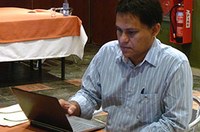 When Jorge A. Huete graduated from the University of California at San Francisco (UCSF) in 1996 with a doctorate degree in biology, he seemed to face a stark choice – either return to his home country of Nicaragua or remain in the United States.
When Jorge A. Huete graduated from the University of California at San Francisco (UCSF) in 1996 with a doctorate degree in biology, he seemed to face a stark choice – either return to his home country of Nicaragua or remain in the United States.
His heart told him to go; his head told him to stay. So, he did what most of us would do. He procrastinated and accepted a postdoctorate position at UCSF.
Anticipating that he would eventually follow his heart, Huete completed a series of successful grant applications over the following two years that enabled him to secure more than USD800,000 in funds to ease his repatriation. In 1999, with the money in hand, he returned home hoping to begin a successful research career.
"I knew it would be difficult. Yet I welcomed the challenge and believed that I had sufficient resources to succeed in a brief period."
However, he soon realized that he had misread the situation. "Money was not the problem," he notes, "but a shortage of personnel was. There were too few biologists to assemble a research team."
In the United States, Huete had engaged in studies exploring the molecular biology of infectious diseases. In returning to Nicaragua, he hoped to continue this line of research but to tailor it to the specific circumstances and conditions in his home country.
But instead of devoting most of his time to research, he found himself concentrating on building scientific capacity – creating a laboratory from the ground up, launching research and training programmes and petitioning governmental agencies to support science.
Nothing was beyond his responsibility. "I had to teach students how to use pipettes (chemical droppers used to dispense minute amounts of chemicals). I had to go to the customs wharfs to pick up equipment that I had purchased from abroad for fear that it would never be released by the authorities. I had to cajole university administrators for the most basic chemicals and classroom materials."
Today, Huete heads a small but productive laboratory comprised of five researchers at the University of Central America, in Managua, Nicaragua's capital city. The group is actively involved in research ranging from human genetics to marine sciences.
Huete has come to realize that capacity building entails more than strengthening laboratories and providing training and research for young students.
"These factors," he notes, "are, of course, important. It's how science progresses one step at a time. But you must also be willing to engage in policy discussions if you hope to achieve change at a larger scale and at a faster pace." It's for this reason that Huete has become a strong public advocate for science.
In 2009, he took his policy efforts a step further when he became the first president of the Academy of Sciences of Nicaragua, the region's newest academy, which has recently joined the Trieste-based IAP, the global network of science academies. At age 45, he is the youngest academy president in the Americas and perhaps the world.
Yet, Huete has not cut his ties to the United States. Last year, his US-born wife and son moved to Massachusetts, and this year he joined them by accepting a two-year visiting scientist position with Ocean Genome Legacy, a biotechnology firm in Ipswich, about 50 kilometres north of Boston. He continues to head his lab, moving back and forth between Nicaragua and the United States in two- to three-week intervals. When in the United States, he keeps in constant touch with students in Nicaragua via Skype.
"It's working out pretty well," he says "I've been able to advance my personal research agenda without undermining my desire to continue to help build the scientific community in my home country. For the moment, I will be living and working on two continents."
Huete's most recent journeys suggest that he has yet to solve the dilemma he faced as a newly minted PhD more than a decade ago.
Yet, the truth is that the stark choice he faced then may not have been as stark as he thought. In today's world, scientists like Huete may indeed find that it is possible to live at home and away at the same time.

